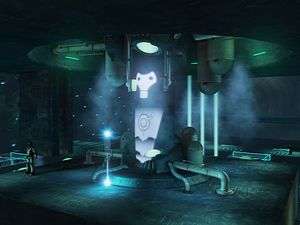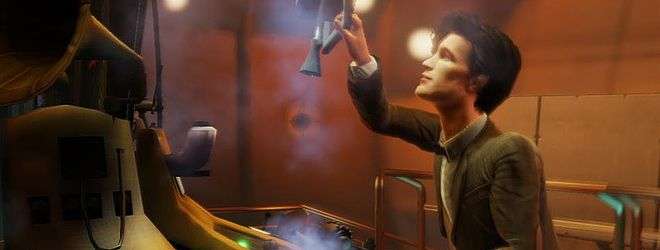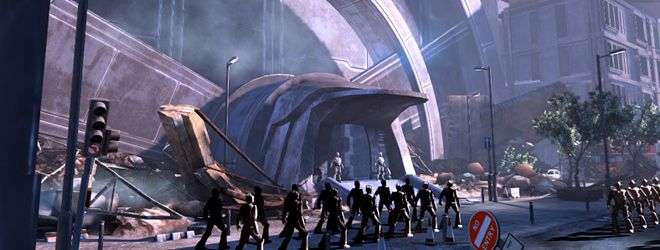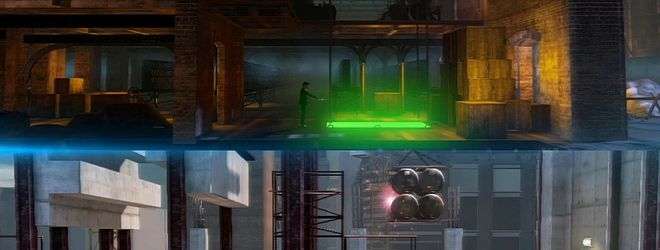Doctor Who: The Eternity Clock – Review
by Edward
 One of the many funny things about life is that sometimes, events come full circle in a way that you’d never expect them to. When I wrote my first article for GamingLives about the BBC’s plan to start making games out of their properties, I speculated that Doctor Who would be an ideal candidate. It has all the ingredients needed to make a compelling videogame: time travel, an energetic protagonist capable of anything (and with possessions that can do whatever the plot requires them to) and a wide range of supporting characters and an even bigger array of villains to choose from. Now, I don’t want to overstate how influential I am or anything, but it can’t be a mere coincidence that two years after my article there was an opportunity to cover a downloadable Doctor Who game, developed by the BBC and Supermassive Games. Like I said, sometimes events come full circle.
One of the many funny things about life is that sometimes, events come full circle in a way that you’d never expect them to. When I wrote my first article for GamingLives about the BBC’s plan to start making games out of their properties, I speculated that Doctor Who would be an ideal candidate. It has all the ingredients needed to make a compelling videogame: time travel, an energetic protagonist capable of anything (and with possessions that can do whatever the plot requires them to) and a wide range of supporting characters and an even bigger array of villains to choose from. Now, I don’t want to overstate how influential I am or anything, but it can’t be a mere coincidence that two years after my article there was an opportunity to cover a downloadable Doctor Who game, developed by the BBC and Supermassive Games. Like I said, sometimes events come full circle.
To clarify, this isn’t the first time a BBC property has become a videogame, and I’m fully aware of that fact. What makes The Eternity Clock special, however, is that it marks the first time the BBC have actively developed a videogame and sold it for profit – with previous titles having been licensed or released for free – and this time they’ve pushed the boat out. To this end, they’ve worked closely with Supermassive Games; the game is published by Sony for the PS3 and Vita, and the titular character was voiced and mo-capped by Matt Smith, the latest actor to fill the boots of the Doctor. For the BBC, this isn’t a cynical cash-in either; the title is the first part of an intended trilogy, and what they hope is the beginning of a long future in making games for the masses.
 Those fans worrying about where this title sits in terms of canon can calm down, however, because, in the words of Simon Harris (the Executive Producer of BBC Worldwide), thanks to the magic of the Doctor being a time traveller there never has to be an official word on where the story takes place, or rather, when. This is also a major reason why the game mostly takes place on Earth; for a series about time travel, none of the licensed games have taken advantage of it. To best showcase what they want to do with the series and to ease in newcomers, the majority of the action of The Eternity Clock takes place on Earth, while later entries in the series will move the action away from our home planet for some more interesting locales, though lips are tight as to where future titles would take us.
Those fans worrying about where this title sits in terms of canon can calm down, however, because, in the words of Simon Harris (the Executive Producer of BBC Worldwide), thanks to the magic of the Doctor being a time traveller there never has to be an official word on where the story takes place, or rather, when. This is also a major reason why the game mostly takes place on Earth; for a series about time travel, none of the licensed games have taken advantage of it. To best showcase what they want to do with the series and to ease in newcomers, the majority of the action of The Eternity Clock takes place on Earth, while later entries in the series will move the action away from our home planet for some more interesting locales, though lips are tight as to where future titles would take us.
Back in the present, The Eternity Clock begins with some promise, with the Doctor conveying a similar energy in his actions and voice acting to that of his appearances in the TV series, and manages to make an entertaining opening, despite his presence being the only one on-screen. This continues as he’s mysteriously transported into the Bank of England, and attempts to escape and figure out why he’s landed there. The first cracks start to appear once you’re in control, and you’re made to do some platforming; the jumping feels a bit light, slightly unreliable and inconsistent to boot. The sense of unease grows, as beyond a sonic screwdriver puzzle you’re made to move boxes around to progress, operate lifts and follow a fixed path. So far, the only real ties to the series are the fact that Matt Smith keeps quipping to himself, you can use a sonic screwdriver to open doors and that, despite having the whole galaxy to explore, you’re stuck in London.
The Doctor soon comes across a doorway which requires two people to help open it, and this is when the action suddenly whisks away to River Song, a frequent sidekick to The Doctor’s antics and currently locked up in Stormcage, apparently the Universe’s most easily escapable prison… at least for River Song. In this section, the platforming takes a backseat to stealth, with the player responsible for helping break Dr Song out of jail by avoiding or occasionally drugging the guards with her hypnotic lipstick. At first, this section felt very much like the late 90s classic Abe’s Oddysee, largely thanks to the ability to hide in various darkened areas to escape patrolling guards. Sadly, that feeling soon escapes as you slowly realise that there’s nothing much to do other than move forward, hide in some shadows and kiss the occasional unsuspecting guard until you reach the end of the section and reunite with the titular protagonist.
This is the point of the game where the ability to utilise two players comes in as you both have to… navigate some platforms, activate the occasional two-person switch or give each other a boost over a large obstacle. That’s actually underselling it somewhat, as later on in the game some interesting situations crop up where one player must complete a puzzle while the other holds back waves of enemies, or both must travel separate paths in order to reach switches much further away.
 Those who don’t have anyone local to play with or just want to soldier on alone are free to do so, with the events compensating by allowing you to perform the actions as both characters. For example, an early event will task The Doctor with solving a puzzle and timing your attempt; once completed, the action will swap over to River Song holding off waves of approaching enemies, who’ll only stop once the timer runs out. In essence, the longer you take to solve a puzzle, the harder the next section of the game becomes. It’s an intriguing mechanic, and one that has promise, but is sadly only employed during boss encounters, and is otherwise relegated in the name of platforming, hiding from enemies or being split up for a long period of time.
Those who don’t have anyone local to play with or just want to soldier on alone are free to do so, with the events compensating by allowing you to perform the actions as both characters. For example, an early event will task The Doctor with solving a puzzle and timing your attempt; once completed, the action will swap over to River Song holding off waves of approaching enemies, who’ll only stop once the timer runs out. In essence, the longer you take to solve a puzzle, the harder the next section of the game becomes. It’s an intriguing mechanic, and one that has promise, but is sadly only employed during boss encounters, and is otherwise relegated in the name of platforming, hiding from enemies or being split up for a long period of time.
Soon after reuniting, our protagonists discover that they’re not the only people in the catacombs of London, and it was at this point where the aforementioned cracks began to splinter off and deepen, as some of the game’s biggest flaws flared up. Throughout The Eternity Clock, players will come across situations where they’re expected to indulge in what is apparently The Doctor’s favourite form of exercise: running away from things. Unfortunately, the game expects you to do this while navigating the inconsistent platforming elements and solving the puzzles between you and your goal, which is made frustrating when you discover that the action in the background doesn’t pause while you tackle the puzzles. The frustration grows when you’re not given a clear amount of leeway between failure and success, meaning that you could feasibly solve the puzzle, progress for another minute and then be told that your enemies have cut you off and that you have to start that section from the beginning. On the harder setting, players will have even less leeway, with the difficulty laying just on the wrong side of the line between ‘tense’ and ‘aggravating’, and any mistakes could easily send you back to the beginning again.
It gets worse too, as along with these chase sequences are multiple moments where the protagonist is expected to evade the guards, run to the puzzle and solve it before they come back around and cause an instant failure as you are unable to escape from them. It would be easier to accurately gauge when the enemies were approaching if more was done with the sound effects, as there isn’t any noticeable distinction between enemies on the other side of the area or those at a dangerously close proximity, and they all shout one of four phrases every ten seconds, meaning that failure results in an additional loss to your sanity unless you turn the sound off – something I was repeatedly forced to do before I gave up and walked off. One section in present day London became so annoying that I actually found myself rage-quitting, as there seemed to be no feasible way to progress due to the large amount of enemies and the massively inconsistent amounts of time I was given to solve the puzzle before I was captured and killed.
 My rage quit turned out to be a big mistake for two reasons, the first of which being that I eventually went back and finished the section by… waiting for the enemy patrols to walk into each other. Seeing as there was apparently nothing in the AI programming to allow them to pass by each other or change direction if another patrol was in their way, both sides stood inactive, too English to let the other through first. I was only able to progress because the AI essentially glitched out and neutralised any nearby threats. So what was the second reason quitting turned out to be a huge mistake?
My rage quit turned out to be a big mistake for two reasons, the first of which being that I eventually went back and finished the section by… waiting for the enemy patrols to walk into each other. Seeing as there was apparently nothing in the AI programming to allow them to pass by each other or change direction if another patrol was in their way, both sides stood inactive, too English to let the other through first. I was only able to progress because the AI essentially glitched out and neutralised any nearby threats. So what was the second reason quitting turned out to be a huge mistake?
Simply put, saving and check-pointing in The Eternity Clock are horrendous. Quitting the game and returning to it later on forces you to start from the beginning of that chapter, which means replaying up to half an hour’s worth of progress if you’re particularly unlucky. Check-pointing is slightly better, but only because occasionally sending you to the beginning of the room or area you’re in is less harsh than having to start the whole chapter again. What makes this particularly odd is that enemies and some objects in the environment will sometimes remember their interactions with you, which will make some stealth sections a lot harder when foes already know where you are and open fire as soon as you re-spawn. It’s quite baffling and makes repeating any sections feel rather schizophrenic as you’re never going to know if you’re starting on the back foot or not.
Considering how much of this game relies on puzzle solving in order to progress, especially under time constraints, you’d probably figure that there would be a wide variety to solve with plenty of variation… well, you’d be figuring wrong. Truth be told, if you include the quick bit of sonic screwdriver action needed to open most doors, there are only seven or eight variations of puzzles throughout the entire game. They don’t do much to enthrall either; one requires rotating panels to complete an image, two involve the passage of electricity (one to light up some bulbs, another to activate two lit nodes); another tasks you with creating a path from one end to another via panels with varying symbols that need to be linked, and another two involve avoiding red balls of energy while guiding grey balls of light to their destination.
 This no doubt thrilling selection is bound to make you salivate when I reveal that there are only a few set solutions, even on hard mode, and there can be moments where you have to do the same kind of puzzle several times in a row without any variation in how you overcome them. In fact, the only times you’ll likely have fun with them are in the Time Corridor sections, where you have to move the platform The Doctor is standing on and match it with the one ahead in order to get back to the TARDIS. Even then, however, it can be unclear and you can complete each section one platform before you should be able to, without any proper strategy. It’s used sparingly and is engaging enough that it becomes the only time you won’t roll your head at the fact you have to solve yet another bloody puzzle before you can proceed.
This no doubt thrilling selection is bound to make you salivate when I reveal that there are only a few set solutions, even on hard mode, and there can be moments where you have to do the same kind of puzzle several times in a row without any variation in how you overcome them. In fact, the only times you’ll likely have fun with them are in the Time Corridor sections, where you have to move the platform The Doctor is standing on and match it with the one ahead in order to get back to the TARDIS. Even then, however, it can be unclear and you can complete each section one platform before you should be able to, without any proper strategy. It’s used sparingly and is engaging enough that it becomes the only time you won’t roll your head at the fact you have to solve yet another bloody puzzle before you can proceed.
By this point you may have gathered that the platforming is substandard, the split-screen features are under-utilised, stealth is a write-off and everything is made worse by the repetitive puzzles and awful saving and checkpoint system. Well, I’m here to tell you it’s not all terrible, as The Eternity Clock has one more saving grace: collectibles! That’s right, throughout the game you can deviate from the path and be rewarded with either one of The Doctor’s many hats or segments of River Song’s diary. Looking at the hats in the menu will then allow you to prompt Matt Smith into commenting on each of the hats, from bowlers to hats worn in his previous incarnations, and especially his beloved fez. There are over forty hats to collect and forty diary segments, too, which allow you to make up ten pages providing more background on River and some of the things she’s been up to in between her adventures with The Doctor in the TV series. That said, you can’t actually wear any of the hats, there’s no benefit to collecting them other than trophies and the diary spoils the plot of the entire sixth season of the show (since its revival last decade). Luckily the game remembers all the hats and diary entries you’ve picked up thus far, which makes it all the more annoying when you’re forced to restart a chapter from the beginning and see that the game is apparently capable of remembering your wardrobe, but not your progress.
The fact Eternity Clock is a game that actually costs physical money could be considered insulting, but when you learn that it’s the first in a series of three and costs as much as half a full retail release, it’s hard not to be outright offended. This game was supposed to be an important step for the BBC, but it would be more accurate to say it’s a step that fumbled, fell down the stairs and shattered all the bones in that leg. The only highlights to the experience are the competent writing and Matt Smith’s voice acting, and they’re not enough to even begin to save this title from the mire. When I view collecting hats to be one of the least bad things about this game, that should give you a fairly good impression of how terrible a time you’ll have with this. Everything else feels wildly inconsistent, from the platforming to the puzzles, the glitchy sound effects, speech and on-screen text, and the fact that no-one’s mouth moves unless they’re in a cut-scene. Take out the writing and all you have left are hats. The fact that there’s a trophy for completing the game in under six hours suggests that the developers think this game is worth replaying. Even if I were held hostage by Daleks, I’d be hard pushed to say this game is barely worth playing.
Pros- Writing is a highlight, filled with references to the 21st Century Who.
- Voice acting is well-done for playable characters.
- ...You can collect hats?
- The platforming
- The stealth
- The puzzles
- The repetition
- Glitchy sound, speech and text
- The story doesn't resolve anything, ends on awful cliffhanger
- The way it drags on
- The repetition
Doctor Who: The Eternity Clock is an incredibly disappointing product with a litany of woes that plague it from beginning to end. While elements of it show promise, the vast majority of it feels like a game that would have been massively out of date and frustrating to play in the late 90s. The graphics are poor, sound effects and enemy speech repeat ad infinitum, puzzles are boring and ridiculously repetitive, the platforming is dire, the stealth sections are banal and you'll be glad to see the back of it long before you reach the end, by which point I'd recommend seeing an actual doctor about that severe case of mental you apparently have.
For any Doctor Who fans, this game is as disappointing as opening the shiniest Christmas present only for it to be a pair of verruca-infested second hand socks, and then discover that someone bought the shittiest fairy lights and the house is now burning down.
Last five articles by Edward
- Best of 2015: Journey's End: A New Beginning
- Journey's End: A New Beginning
- You Can't Choose Your Happy Ending
- Okay, Let's Fix Comedy In Games - The V-Effekt
- Time Keeps On Smashing Away



























Great review. I was really interested in this game, but it looks like another unfortunate licence cash-in not doing the subject matter justice. This makes me sad
DLOLctor Who mer like.
Screenies don’t look completely shit though.
I agree with Richie… looks sexy but ultimately sounds like a miss. Shame – great game potential there